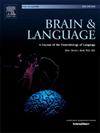Context-modulating effect on processing scientific metaphors: Evidence from ERPs
IF 2.3
2区 心理学
Q1 AUDIOLOGY & SPEECH-LANGUAGE PATHOLOGY
引用次数: 0
Abstract
Previous event-related potential (ERP) studies have demonstrated the neural specificity of cognitive processing mechanisms in scientific metaphors. This property makes semantic retrieval and extraction more difficult compared to conventional metaphors. However, the role of context in modulating the comprehension of scientific metaphors remains unclear, and there has been no analysis or categorization of abstract and difficult scientific metaphors. In this study, we used the sentence-final word paradigm to investigate the effects of different contextual conditions on the comprehension of two types of scientific metaphors. We aimed to observe (Experiment 1) whether there are any differences between the processing of the two types of scientific metaphors in the context-free condition and (Experiment 2) whether the context affects the comprehension of the two types of scientific metaphors in the contextualized condition. Additionally, we explored the modulating effects of relevant and irrelevant contexts on the two types of scientific metaphors. Both N400 and late negative component (LN) effects were found in the two experiments. The N400 analysis showed that SMF (SMF refers to scientific metaphors whose source domain and target domain have similarities in functions in present study.) evoked more negative N400 than SMS (SMS refers to scientific metaphors whose source domain and target domain have similarities in shapes in present study) in the context-free condition. The result suggests that the processing of SMF might be more difficult than that of SMS. However, in the relevant-context condition, there was no significant difference in the N400 amplitudes of the two types of scientific metaphors. In contrast, in the irrelevant-context condition, SMS elicited significantly more negative N400 than SMF. Analysis of the LN revealed no significant differences between SMS and SMF in the two experiments. The results indicate that the context might affect information extraction and retrieval, but not the late reasoning stage about scientific knowledge. Moreover, the relevant context might facilitate the comprehension of both types of scientific metaphors, whereas the irrelevant context might hinder the processing of them. More importantly, the interference seems greater for SMS.
情境调节对科学隐喻加工的影响:来自erp的证据
事件相关电位(ERP)研究已经证明了科学隐喻认知加工机制的神经特异性。与传统隐喻相比,这一特性使得语义检索和提取更加困难。然而,语境对科学隐喻理解的调节作用尚不清楚,也没有对抽象和难理解的科学隐喻进行分析和分类。在本研究中,我们采用句末词范式考察了不同语境条件对两类科学隐喻理解的影响。我们的目的是观察(实验1)在无语境条件下对两类科学隐喻的加工与(实验2)在语境化条件下语境是否影响两类科学隐喻的理解之间是否存在差异。此外,我们还探讨了相关语境和不相关语境对两类科学隐喻的调节作用。两个实验均发现N400和后期负组分(LN)效应。N400分析表明,在无语境条件下,SMF (SMF指源域和目标域在功能上相似的科学隐喻)比SMS (SMS指源域和目标域在形状上相似的科学隐喻)诱发的负性N400更多。结果表明,SMF的处理可能比SMS的处理更困难。然而,在相关语境条件下,两类科学隐喻的N400振幅没有显著差异。相反,在不相关语境条件下,短信诱发的负性N400显著高于短信诱发的负性N400。在两个实验中,对LN的分析显示SMS和SMF之间没有显著差异。结果表明,语境可能影响信息提取和检索,但不影响科学知识推理的后期阶段。此外,相关语境可能促进对两类科学隐喻的理解,而不相关语境可能阻碍它们的加工。更重要的是,对短信的干扰似乎更大。
本文章由计算机程序翻译,如有差异,请以英文原文为准。
求助全文
约1分钟内获得全文
求助全文
来源期刊

Brain and Language
医学-神经科学
CiteScore
4.50
自引率
8.00%
发文量
82
审稿时长
20.5 weeks
期刊介绍:
An interdisciplinary journal, Brain and Language publishes articles that elucidate the complex relationships among language, brain, and behavior. The journal covers the large variety of modern techniques in cognitive neuroscience, including functional and structural brain imaging, electrophysiology, cellular and molecular neurobiology, genetics, lesion-based approaches, and computational modeling. All articles must relate to human language and be relevant to the understanding of its neurobiological and neurocognitive bases. Published articles in the journal are expected to have significant theoretical novelty and/or practical implications, and use perspectives and methods from psychology, linguistics, and neuroscience along with brain data and brain measures.
 求助内容:
求助内容: 应助结果提醒方式:
应助结果提醒方式:


